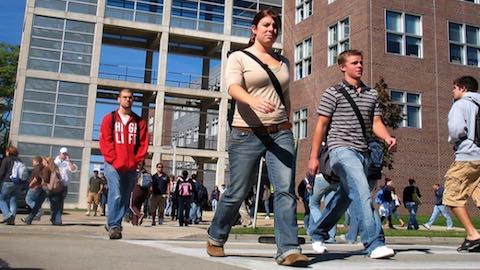- MENU
- HOME
- SEARCH
- WORLD
- MAIN
- AFRICA
- ASIA
- BALKANS
- EUROPE
- LATIN AMERICA
- MIDDLE EAST
- United Kingdom
- United States
- Argentina
- Australia
- Austria
- Benelux
- Brazil
- Canada
- China
- France
- Germany
- Greece
- Hungary
- India
- Indonesia
- Ireland
- Israel
- Italy
- Japan
- Korea
- Mexico
- New Zealand
- Pakistan
- Philippines
- Poland
- Russia
- South Africa
- Spain
- Taiwan
- Turkey
- USA
- BUSINESS
- WEALTH
- STOCKS
- TECH
- HEALTH
- LIFESTYLE
- ENTERTAINMENT
- SPORTS
- RSS
- iHaveNet.com: Education

Why Some College Students Fail
By Jill Richardson
For students on the margins, there's only so much of them to go around.
Another semester is about to begin at the community college where I teach.
Some of my students come from middle class backgrounds. They went to excellent high schools, enjoy financial and emotional support from their parents, and have what it takes to excel in college.
Others went to failing high schools that failed to get them college-ready. Some grew up in poverty and even faced homelessness or hunger -- or still suffer those hardships now. They may or may not have loving, supportive parents.
Many of them are adults who live independently and support themselves. Others live at home but help support their parents or care for younger siblings.
At the end of the semester, I must give them all a grade.
Many students fail. Others pass but with a C.
And I know, when I give them these grades, that future colleges and employers will look upon the grades as a mark of my students' abilities. A low grade must mean either you're not intelligent enough to do well, or you didn't work hard enough.
Sara Goldrick-Rab, in her book Paying the Price, shows that this isn't true. For low-income students, a low grade often doesn't reflect a lack of hard work, intelligence, or responsibility. It reflects that humans can only be pushed so far until they hit a breaking point.
When students are homeless, hungry, working part or full-time, or taking care of siblings or elderly relatives or their own children, there just isn't enough time left in the day to spend enough time on school work to do well.
The problem can be even trickier for students who, through no fault of their own, had the misfortune to attend a substandard high school.
It's common for students to work two jobs in addition to attending school, or to lack the money to purchase the textbook. They don't necessarily have the time or ability to come for tutoring or attend office hours. Some come from as far as two hours away by bus, and each trip to campus involves four hours of transportation time.
Why do we live in a society that thinks that it's reasonable to ask someone to shoulder an adult's responsibility at home, support themselves and perhaps other family members too, and go to school on top of that? And then why do we call them failures when that doesn't work?
Some students receive financial aid to cover their tuition, but that doesn't cover their other needs. It doesn't keep them from working long hours, sometimes on the night shift, in order to make ends meet at home.
This year, some students have an added challenge.
Some are undocumented immigrants, brought here as children through no fault of their own. Obama allowed them to pay a fee in order to avoid deportation and legally work in the U.S. temporarily. Trump ended that program.
When students' two year work permits run out, what will happen to them? Some students have had relatives, parents even, get deported.
Students who try to educate themselves in these conditions are heroes. We should make it easier, not harder, for them to devote themselves full time to study.
And we certainly shouldn't discuss them as if they are human garbage who should be deported.
OtherWords columnist Jill Richardson is the author of Recipe for America: Why Our Food System Is Broken and What We Can Do to Fix It. Distributed by OtherWords.org.
Tags: DACA, higher education, immigrants, poverty, student debt
Article: Courtesy Other Words.
WORLD | AFRICA | ASIA | EUROPE | LATIN AMERICA | MIDDLE EAST | UNITED STATES | ECONOMICS | EDUCATION | ENVIRONMENT | FOREIGN POLICY | POLITICS
Education - Why Some College Students Fail